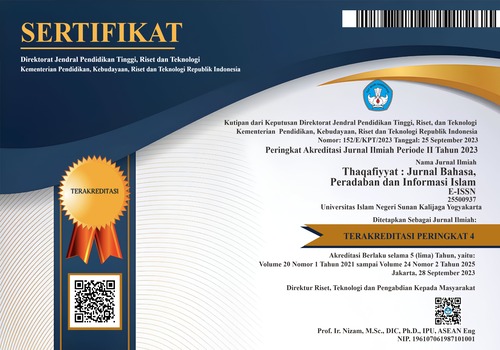MENGKAJI (BUDAYA) SANAD ULAMA TANAH JAWA
Abstract
This article discusses the alumni of Japan Indonesian Muslim
viewpoints in connection with their study experiences in Japan. Their
motivations to study in Japan are opportunity available, the ease of getting a scholarship, boost the positive image of Japanese from their parents, positive impression on Japan from their senior, interest in Japanese culture and technology advances, interest in English-language classes and programs. The constraints they face while studying in Japan is divided into academic and nonacademic issues. Academic problems are: different fields of study with academic tutors, language and communication problems, the problem of interaction with academic counselors. Non-academic problems did not largerly happen because
they did not experience financial problems, obtaining economical
accommodation for academic tutors help, having special facilities for foreign students, can overcome the problem by cooking own food, buy food at the halal food store or order via the internet, able to adapt to different weather and climate, and social support from the community and the government of Japan that helps international students so that they feel comfortable studying in Japan.
Keywords: Muslim, Indonesia, study, Japan
Downloads
References
Downloads
Published
Issue
Section
License
Authors who will publish with this journal agree to the following terms:
- Thaqafiyyat: Jurnal Bahasa, Peradaban dan Informasi Islam publishes all articles entirely in full text.
- It is permissible for readers to download and to use it for scientific purposes and scientific dissemination.
- Authors retain copyright and grant the journal right of first publication with the work simultaneously licensed under a Creative Commons Attribution License that allows others to share the work with an acknowledgement of the work's authorship and initial publication in this journal.
- Authors are able to enter into separate, additional contractual arrangements for the non-exclusive distribution of the journal's published version of the work (e.g., post it to an institutional repository or publish it in a book), with an acknowledgement of its initial publication in this journal.
- Authors are permitted and encouraged to post their work online (e.g., in institutional repositories or on their website) prior to and during the submission process, as it can lead to productive exchanges, as well as earlier and greater citation of published work.










